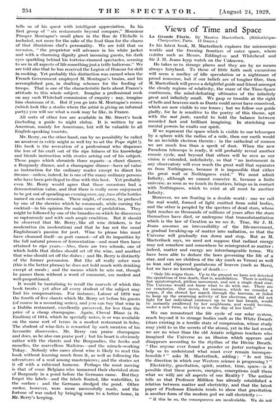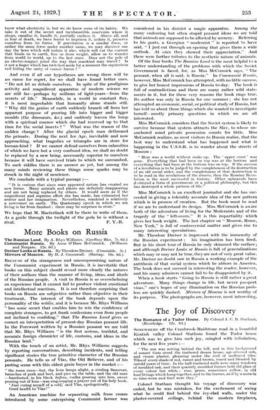Views of Time and Space
La Grande Feerie. By Maurice Maeterlinck. (Bibliothequa, Charpentier, Paris. 12 francs.) IN his latest book, M. Maeterlinck explores the microscopic worlds and the freezing frontiers of outer space, where vedettes such as Messrs. Eddington and Whitehead and Sir J. H. Jeans keep watch on the Unknown.
He takes us to strange places and they are by no means always fairyland. To those of little faith such excursions will seem a medley of idle speculation or a nightmare of proud nonsense, but if our beliefs are of tougher fibre, then M. Maeterlinck will prove a delightful guide and friend amongst the cloudy regions of relativity, the maze of the Time-Space continuum, the mind-defeating ultimates of the infinitely great and infinitely small. We gasp or tremble at the sight of hells and heavens such as Dante could never have conceived, which are now visible to our lenses ; but we follow our guide gladly, for he is sensitive to the poetry of this theme, apt with the mot juste, careful to hold the balance between recorded fact and brilliant imagining. In stretching our mental powers he exalts our spirit.
If we represent the space which is visible to our telescopes by a sphere with the radius of a mile, then our earth would be an invisible electron therein : in the cathedral of cosmos we are much less than a speck of dust. When the new Pasadena telescope is ready, it will probably reveal another cosmic cycle, and beyond that others will be seen as our vision is extended, indefinitely, so that "no instrument in any observatory will ever reach the great wall that separates us from Nothingness, because it is impossible that either the great wall or Nothingness exist." We must admit Infinity, although we cannot conceive it, because a finite. universe, as soon as we touch its frontiers, brings us in contact with Nothingness, which to exist at all must be another Infinity.
Moreover, we are floating in a double world : one we call the real world, formed of light emitted from solid bodies, and the other is peopled by the spectres of dead stars, whose light reaches us thousands of millions of years after the stars themselves have died, or undergone that transubstantiation which is the law of Creation as we see it. True, Sir J. H. Jeans assumes an irreversibility of the life-movement, a gradual breaking-up of matter into radiation, so that the Universe will gradually run down and stop. But as M. Maeterlinck says, we need not suppose that radiant energy may not somehow and somewhere be reintegrated as matter : indeed, matter and energy are interchangeable terms. We have been able to deduce the laws governing the life of i star, and can see children of the sky (such as Venus) as well as lean and slippered pantaloons of heaven (such as Mars), but we have no knowledge of death :—
" Only life reigns there. Up to the present we have not detected the operations of true death, that is, annihilation. There is nothing but uninterrupted, pitiless movement, and not a single dead star. The Universe would not know what to do with one. There are no cemeteries. Our moon, for instance, which we consider a corpse, if she slowed her march through the heavens, or failed to keep up the swarming activity of her electrons, and did not fight for her individual existence up to her last breath, would be instantly swallowed by her neighbours, and would become, under a new form, as living as on the day of her birth."
We can reconstruct the life cycle of our solar system, reach beyond it to strange bodies such as the White Dwarfs (stars existing in a terrific state of compression, whose study may yield to us the secrets of the atom), yet in the- laet resort we are no wiser than the old Asiatic religious teachers who imagined the Universe as an illusion which appears and disappears according to the rhythm of the Divine Breath. "Has anyone ever found a grander or justei metaphor to help us to understand what must ever remain incompre- hensible ? " asks M. Maeterlinck, adding : "Is not this the direction in which our Western science is progressing ?
Electricity, gravitation, spirit, Matter, time, space—is it possible that these powers, energies, conceptions (call them
what we are all aspects of one Reality ? The author tells us that Professor Milliken has already established a relation between matter and electricity, and that the latest paper of Professor Einstein tends to show that gravitation is another form of the modern god we call electricity :— -" If this be so, the consequences are incalculable. We do not
know what electricity is, but we do know some of its habits. We take it out of the secret and inexhaustible reservoirs where it sleeps, canalize it, handle it, partially enslave it. Above all, and in fear of death, we have learnt to imprison it, isolate it, preserve ourselves from its furies. If gravitation is a similar force, or rather the same force under another name, we may discover one day the laws which will isolate it also, which will cut the current that binds us to earth, free us from weight, allow us to wander from world to world, up to the last stars. Does not the pole of an electro-magnet point the way that mankind may travel ? Is it not a finger which has twitched aside for a moment the mysterious veil hiding the unity of cosmic forces ?
And even if all our hypotheses are wrong there will be no cause for regret, for we shall have found better ones. "Do ,not let us delude ourselves. In spite of the prodigious activity and magnificent apparatus of modern science we are still far—perhaps by millions of light-years—from the secrets of life." Meanwhile, in a world in constant flux, it is most improbable that humanity alone stands still. "Why did the genius of earth suddenly branch off from her apparent purpose of pouring life into bigger and bigger moulds (the dinosaurs, &c.) and suddenly leaven the lump with a spiritual essence which she had reserved up to that time for the social insects ? " What was the reason of the sudden change ? After the glacial epoch man dethroned the primate. During the next Ice Age, inevitable and now approaching, what tragedies or triumphs are in store for human-kind ? If we cannot defend ourselves from calamities of which we have but a very confused idea, we shall no doubt be replaced by a new being, necessarily, superior to ourselves because it will have survived trials to which we succumbed. To such riddles there is no answer as yet, but among the many minds reviewing these things some sparks may be struck in the night of nescience.
We conclude with a typical passage :—
" It is curious that since man appeared nature has created no new forms. Many animals and plants are definitely disappearing and are not being replaced by others. It would seem as if the magnificent and supreme effort she has made, has exhausted her ardour and her imagination. Nevertheless, mankind is relatively a newcomer on earth. The Quaternary epoch in which we are living is far from finished : there may be surprises in store."
We hope that M. Maeterlinck will be there to write of them.
As a guide through the twilight of the gods he is without a































 Previous page
Previous page